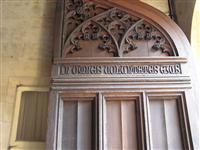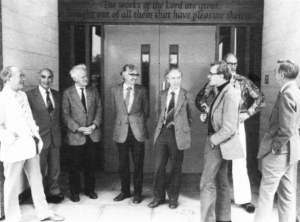Over the main entrance of the Cavendish Laboratory, the home of the Department of Physics in the University of Cambridge, is an inscription: ‘The works of the Lord are great; sought out of all them that have pleasure therein’. This use of a Bible passage in architecture is somewhat unusual for a university physics laboratory that was built in 1973.
The passage was placed there at the suggestion of Andrew Briggs, who was a PhD student at the time. Briggs is now Professor of Nanomaterials at Oxford University. He appreciated the Latin inscription of Psalm 111 verse 2 carved on the doors of the first Cavendish Laboratory, almost certainly at the instigation of the first Cavendish Professor, James Clark Maxwell. He suggested that it should be put up, in English, at the entrance of the new building.
The incident is described by AB Pippard, formerly Cavendish Professor in the University of Cambridge, in the European Journal of Physics. ‘The great oak doors opening on the site of the original building had carved on them, by Maxwell’s wish, the text from Psalm 111 Magna opera Domini exquisita in omnes voluntates ejus. Shortly after the move to the new buildings in 1973 a devout research student suggested to me that the same text should be displayed, in English, at the entrance. I undertook to put the proposal to the Policy Committee, confident that they would veto it; to my surprise, however, they heartily agreed both to the idea and to the choice of Coverdale’s translation, inscribed here on mahogany by Will Carter.’
This is a great example of how open minded Cambridge science departments can be, and their willingness to recognise the Christian heritage that was so important in the development of modern science. It’s also an example of what a student can achieve if they put their mind to it.
Many thanks to Professor Briggs for helping me with my research on this story.
NEW: Be encouraged and equipped with a new bite-sized resource every month, including a short video, article and discussion questions. Join for free on Patreon for access to each month’s set of material, addressing a different topic/Bible passage each month AND two podcasts with experts on the same topic.
If you would like to support this work financially (£6/month) you will also receive these benefits:
- access to two live podcast recordings each month, where you can ask questions of experts in the topics covered and meet like-minded people.






